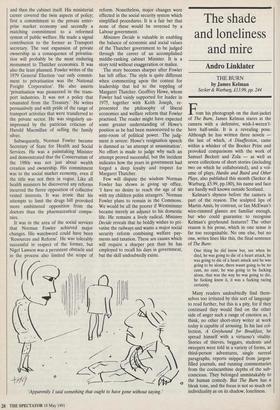The shade and loneliness and mire
Andro Linklater
THE BURN by James Kelman
Secker & Warburg, £13.99, pp. 244
Eom his photograph on the dust-jacket of The Burn, James Kelman stares at the camera with a defensive, wish-I-weren't- here half-smile. It is a revealing pose. Although he has written three novels the last of which, A Disaffection, came within a whisker of the Booker Prize and provoked comparisons with the work of Samuel Beckett and Zola — as well as seven collections of short stories (including two on which he collaborated), and a vol- ume of plays, Hardie and Baird and Other Plays, also published this month (Secker & Warburg, £5.99, pp.180), his name and face are hardly well known outside Scotland.
Kelman's shyness before the camera is part of the reason. The sculpted lips of Martin Amis, by contrast, or Ian McEwan's wire-rimmed glasses are familiar enough, but who could guarantee to recognise Kelman's greyhound features? The other reason is his prose, which in one sense is far too recognisable. No one else, but no one, writes lines like this, the final sentence of The Bum:
One thing he did know but, see when he died, he was going to die of a heart attack, he was going to die of a heart attack and he was going to be alone, there wasnt going to be no cunt, no cunt, he was going to be fucking alone, that was the way he was going to die, he fucking knew it, it was a fucking racing certainty.
Many readers undoubtedly find them- selves too irritated by this sort of language to read further, but this is a pity, for if they continued they would find on the other side of anger such a range of emotion as, I think, no other short-story writer at work today is capable of arousing. In his last col- lection, A Greyhound for Breakfast, he spread himself with a virtuoso's vitality. Stories of thieves, beggars, students and sweepers were told in a variety of forms, as third-person adventures, single surreal paragraphs, reports snipped from jargon- filled journals, and running commentaries from the coelacanthine depths of the sub- conscious. They belonged unmistakably to the human comedy. But The Burn has a bleak tone, and the focus is not so much on individuality as on its shadow, loneliness. Most of the stories are told as interior monologue, an often unforgiving form to read since it traps your imagination within that of a single character, but which, in Kelman's hands, gives the impression of inhabiting another person's mind as though it were your own — the literary equivalent of virtual reality. He achieves this effect partly through the rhythm of his prose, which matches the changing thought-beat of a mind under stress, and partly through the spare fashion in which he tells his stories.
In 'That Thread', for example, he takes less than 750 words to convey the rocket- like parabola of masculine reaction as a beautiful woman appears entering a bar, rising from peacock display to self-congrat- ulatory lust, then toppling into disappoint- ment and despair when she abruptly leaves.
Most of his characters are struggling not to fall apart in the turbulence of daily life. `People are under pressure', a man con- cludes in 'Events In Yer Life'. 'Ye never know what's going on under the surface'. In fact, what is going on under the surface is a desperate search for someone to support them, and time after time they try to find in others' solitude a relief from their own: in a cinema a timid man imagines comforting a weeping girl; a sales trainee and an old trade unionist try to use each other as con- fessors; two former art students attempt to understand why they used to be friends. The sales trainee's state of mind might serve for all of them as he sits alone 'sur- rounded by everything hostile you could possibly conceive of in the universe'.
The ultimate hostility is the same as it always has been — Timor mortis conturbat me — which is also the last loneliness. But what is remarkable about these stories is how the threat of death's vast emptiness presents itself, not through explicit thought or emotion, but through unconscious awareness. The language of this apprehen- sion is the accelerating rhythm of the words, the swearing, and repetition of phrases. Nowhere is it used more tellingly than in the last story, which gives the vol- ume its title.
A man stumbling through a rain-swept park suddenly realises that beyond the swollen burn is a children's playground where years earlier his daughter was killed in an accident. The realisation comes to him through a series of bodily sensations, at first, as though someone were watching him:
He stood where he was, he just stood there. Then he felt it again, right across his shoul- der. It was a chill. He had caught a chill. Definitely. He was damp, he was bloody cold. He was oh Christ almighty and he felt it another time now right across his chest as well a sort of tremor and down his thighs to his knees it was, it was like a tremor, a spasm. But it was his daughter, it was his daughter. Like her ghost was somewhere. He knew it. He knew what it was exactly.
Glasgow is the setting for most of these stories, but there is nothing local about their context. Or their author. His is a talent which everyone should cherish.



























































 Previous page
Previous page